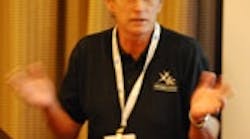Chuck Carter, center director of the Fieldbus Center at Lee College of Baytown, Texas, discussed the requirements for technical training necessary for operators who are trained and knowledgeable about fieldbus and how to use it. Carter called his presentation at this week’s Yokogawa Users Conference “Fieldbus 1—A Roadmap for Gaining Critical Skills.”
“In an environment of rapidly changing technologies, foundational skills become even more critical, ” says the Fieldbus Center’s Chuck Carter discussing an effective training plan for getting operators up and running on fieldbus.
Carter began with a little history lesson about the Fieldbus Center and how it has evolved from its beginnings in 1998 with a pilot installation and a few students. In 2000, the center received its first NSF grant to build fieldbus education for industry. In 2001, the center started providing instructor workshops for college instructors. “If you’re a college teacher, see me afterwards…” Carter cracked.
In 2002, the center inaugurated what Carter called the IICTA College/Industry Alliance. In 2003, it added more workstations and began offering industrial engineering and maintenance fieldbus courses, and in 2004 the Center received its second NSF grant for phase-two course development and applied research. Since then, the Center has been concentrating on acquiring a greatly expanded collection of host and device types and adding R&D efforts for testing device suitability.
“Here are some facts I want you to think about,” Carter said. “Sixty-five percent of work orders generated for transmitters are bogus—either no problem or the problem is with other equipment, not the transmitter. Here’s another fact. Seventy-five percent of control valves removed from process lines did not require removal. Why did they get removed?”
Audience members provided answers, including, “Because,” “It got removed this time last year,” and “It was time.”
“And because of this,” Carter said, “50% of an instrument tech’s time is spent on paperwork clearing these bogus work orders.”
In traditional analog field installations, field maintenance stops at the marshalling cabinets. Beyond that, the control system techs take over. In a fieldbus system, the technicians need to be capable on the entire system, because the DCS and other control systems are simply other nodes on the network.
In a typical system with roughly 1,500 field devices, Carter said, converting to fieldbus eliminates on the order of 2,500 terminations, allowing the removal of at least a half- dozen marshalling cabinets and associated power and conditioning devices. That will, he said, reduce the required maintenance on the system, but will require a more sophisticated and more highly trained work force.
So what does that work force need to know?
Carter said that a good fieldbus training program should teach operators to:
- Recognize applications of fieldbus technology
- Define fieldbus terms and concepts
- Operate a fieldbus segment/network
- Build a simple fieldbus segment
- Apply intrinsic safety to fieldbus
- Connect components to a fieldbus segment
- Tag and address devices
- Configure blocks and block parameters
- Recognize network concepts and terms
- Work with fieldbus control loop strategies
- Identify host and device characteristics/features
- Use/maintain required documentation and software
- Identify resources for in-depth training
- Apply system-specific training
- Respond to system or device problems efficiently and safely.
Training and development, Carter said, should be staged to allow one to five days of instruction at a time, combined with experiential time. “That’s hands-on,” he said.
Companies should budget 100 training hours for each design or engineering staff member and 50 hours for each maintenance or service person. “Include a training and shop system in the budget,” Carter cautioned, “and budget around $500 per person per day plus expenses for general training. Allow sufficient time for your operators, engineers and maintenance people to gain product knowledge.”
So what’s the ROI? The return depends greatly, he said, on a variety of factors. Can you do internal vs. external training? How much do you want the training customized, and how deeply did you analyze the training needs beforehand? Do you have Internet access and a highly experienced instructor? Does management visibly support this training effort? Are you allowing the amount of time needed to actually learn and develop an experience base?
What you typically see, he said, are ROI deliverables centered around cost avoidance and cost enhancement. Reduced head count, callouts, avoiding design or service errors—these are all cost avoidances, Carter explained. Improving product quality and quantity, better use of the equipment and the features of the control system, enhanced system data, better maintenance and a productive team are cost enhancements that are usually achieved with good fieldbus training.
“In an environment of rapidly changing technologies,” Carter said, “foundational skills become even more critical, and developing fieldbus skills requires a carefully crafted plan. Technologists can become even more valuable and even minimize design workarounds, but only if they are adequately educated and included.”
Finally, Carter said, “Fieldbus training should take into account all phases of a unit’s life cycle and should include the entire team.”




